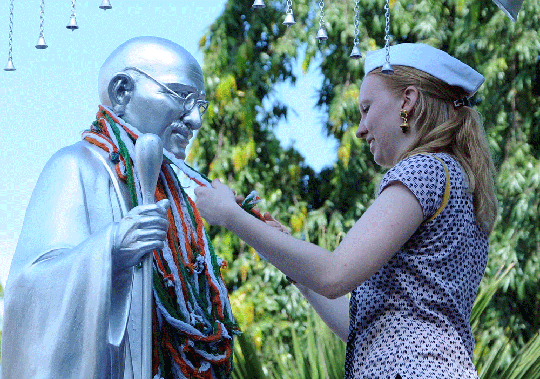Internet users in the United States at the second spot on the list of readers of books and writings on Mahatma Gandhi, even though he never visited America in his lifetime, showed a analytics report of a prominent website on the Father of the Nation.

According to a Google Analytics report of website www.mkgandhi.org, majority of online readers or researchers on Mahatma Gandhi belong to India, while the US comes at the second place in terms of page viewing, downloading, e-book reading and downloading, designer of the website, Rajesh Shinde said referring to the findings.
Google Analytics is a 'freemium' web analytics service that tracks and reports website traffic.
The United Nations has declared Mahatma Gandhi's birth anniversary as International Non-violence Day, being observed today the world over.
Launched in 1998, www.mkgandhi.org is a comprehensive website by Gandhian institutions, operated and updated by city-based trust Bombay Sarvodaya Mandal, which works to promote and spread the work by and on Mahatma Gandhi through seminars, workshops, meetings, youth camps among others.
The website comes at the first place in the search results on Google, out of the 11,90,00,000 results, Shinde said.
"The real time analysis of the online presence of the readers shows that the content of Gandhi or by Gandhi, are read and downloaded in all the 204 countries across the globe and netizens in the US always come to second after India," he said.
"In the last six years, there have been over 10 million downloads of e-books, out of which Indians had over six million downloads while 2.5 million downloads came from the US," he added.
"As per the report, on average annual basis, users from Pakistan varies from 18th to 20th position, which reflects the significance of the freedom fighter in that country," Mandal's managing trustee Tulsidas Somaiya said.
He said seeing the popularity of digital era, especially mobile apps, the mandal has started converting more than 150 books related to Mahatma Gandhi into e-books supporting epub, pdf and mobi domains.
According to web statistics report for the portal for the month of September, the most searched and researched topics on Gandhi are Mind of Mahatma Gandhi, India Dreams, Story of My life, Handbook of Peace and Conflict Studies and The Murder of Mahatma, Somaiya said.





Comments
Add new comment